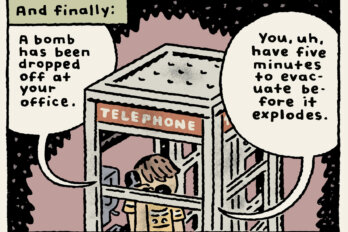When Casey Plett won the Amazon Canada First Novel Award, the entire room stood up and cheered. Her win was unprecedented in Canada. While other trans women writers in Canada have made important literary contributions, we are rarely recognized for our achievements. I couldn’t help crying while I watched her walk up to the podium to accept the $60,000 prize, struck by how pivotal it was for the gatekeepers of Canadian literature to acknowledge Little Fish.
Watching another trans woman win a major literary award seemed impossible before Little Fish. It’s true that there were a few positive reviews of Little Fish in Canadian media, principally in the Globe and Mail, where Jade Colbert wrote that Little Fish wasn’t about “trans pasts, but trans futurity.” At the same time, though, none of the other major literary awards shortlists, such as those of the Giller, the Governor General’s, and the Writers’ Trust, included trans women this year. And, on the whole, it seemed to me that Canadian literature and its institutions did what they often do: ignore the book in favour of other flashy titles by cisgender writers.
The celebration of trans life in Little Fish and the subsequent critical reception for the novel is a long-awaited revolution in the possibilities for trans literature. Trans women writers—in a variety of genres—have been producing groundbreaking literature in Canada for decades, but until Little Fish, we have rarely been celebrated for our literary work. Trans writing has often been constrained to what will appeal to cisgender audiences, namely creative nonfiction or poetry that chronically documents our relationships to our bodies and genders. Writing that examines the everyday aspects of trans womanhood—dating, going to work, spending time with friends—is almost never celebrated or visible in Canada.
But Little Fish shows us that it should be.
I was an early reader of Little Fish. There are very few published trans women writers in Canada; we often rely on each other for friendship, career advice, and editorial feedback. I remember sitting with Casey in a downtown Toronto sushi restaurant as we talked about an early draft of the novel. I was a year into my transition and still discovering what life as trans woman was like. Little Fish was a revelation to me. Between its pages, I discovered a rich literary world that managed to speak to what I was living through—a life beyond transition.
Little Fish is a novel focused on the life of Wendy Reimer, a thirty-year-old post-op trans girl living in Winnipeg, and her journey to uncover her deceased Mennonite grandfather’s possible trans experiences. Like most trans women in Canada, Wendy is precariously employed and lives in significant endangerment. She relies on a close-knit group of trans women, as well as her father, to survive. At various points in the novel, Wendy faces intense discrimination from health care providers, intimate partners, employers, family members, and strangers on the street. Little Fish presents Wendy’s world in straightforward terms, never shying away from honestly reflecting what everyday trans girl life is like.
While many trans novels begin with a chronological story or flashbacks of how the main character realized they were trans, Little Fish begins eight years after Wendy’s transition and gender affirming surgery. As Plett noted in her Walrus essay “The Rise of the Gender Novel,” trans novels in Canada have often been written by cisgender writers. While these titles have been strongly critiqued by trans folks for their cisnormative and inherently transphobic portrayals of trans life, Plett identifies a deeper issue with these works of fiction. All these works use trans characters to tell the same formulaic “gender identity” story.
The “gender novel” trope, as described by Plett and other trans writers, portrays trans protagonists as long-suffering, brutalized, and solitary heroes who struggle to become their genders. Often, trans characters are socially isolated, cut off from family supports, and fixated on one-dimensional gender-identity struggles. Notable prizewinning examples of the “gender novel” genre include Kim Fu’s For Today I Am a Boy, Kathleen Winter’s Annabel, and Jeffrey Eugenides’s Middlesex, the latter two of which feature protagonists who are intersex. These tropes also frequently play out in trans-related media coverage or literary reviews. Trans life—the inherent complexities and nuances of trans experience—are reduced to the simplest terms and pitched to appease cisgender expectations.
While the demise of the “gender novel” may still be a long way off, Plett’s Little Fish shows what trans writers can do when we are not expected to educate or entertain cisgender audiences. Of course Little Fish is still educational and entertaining but on its own terms and without compromising its artistic integrity. Such literature by trans women and two-spirit individuals living in Canada is a rapidly expanding genre. See: Arielle Twist’s new poetry collection, Disintegrate/Dissociate, Lindsay Nixon’s memoir, nîtisânak, Jia Qing Wilson-Yang’s novel, Small Beauty, or Kai Cheng Thom’s new essay-and-poetry collection, I Hope We Choose Love. But we still have a long way to go before trans literature can fully realize its potential.
When I spoke with Plett about the first draft of Little Fish, I told her that it was an important book—not because of the representative value of seeing trans life accurately portrayed but because it expanded the boundaries of what literature about trans women could be about. It wasn’t a sensational tell-all memoir about gender discovery nor a glamorous account of inspirational trans womanhood complete with makeup ads and shimmering selfies.
In an interview with William Horn for Columbia Journal, Plett described how her intention was not to write Little Fish for cis readers. “I wrote for trans women, building a world that anyone else can be invited to and go along with”, Plett said. “I realized that reading something that isn’t for you can be so intimate….What better way to experience a world that doesn’t belong to you?” This is a radical departure from how Canadian literature expects trans writers to structure our work. In the same interview with Horn, Plett stated that she unsuccessfully sent the novel to several major North American publishers, adding that “if I had written a book that was more geared towards a cis readership, things would have been very different.”
Plett persisted through early literary rejection. Little Fish found a home with Arsenal Pulp Press and came into the world. Almost a year later, it won the Amazon Canada First Novel Award and then, just over a week later, the Lambda Literary Award for transgender fiction. The significance of these wins can’t be overstated. Little Fish broke from the standard formula for trans literature in Canada, defied the so called gender novel, and created new possibilities for what writing about trans life can be.
In the opening scene of Little Fish, a group of trans women are talking in a bar. Wendy listens as her friends drunkenly narrate how life operates differently for trans people. One of the trans women, Sophie, asks a simple but provocative question. “What are the cis people in my life doing,” she says, “versus what the trans people in your life are doing?” Her question is left unanswered by the other trans women in the scene, but it lingers throughout the rest of the book.
Sophie’s question is an important one. It introduces the reader to the idea that there are meaningful differences between trans and cis lives, but it also reflects the fact that Plett wrote Little Fish for other trans women. The reader must answer Sophie’s question for themselves, relying on their own lived experiences to compare cis and trans lives. Most cisgender readers would be unable to make that comparison with any degree of accuracy. That’s because many cisgender readers don’t have close relationships with trans people. For a trans reader, the answer to Sophie’s question is obvious.
Cis people have an ordered script for their lives that includes a clearly defined journey through adolescence into adulthood, often punctuated by milestones like graduation, jobs, marriages, and births. This cisnormative script validates their experiences and presents them with numerous possibilities for interpersonal fulfillment. Trans people have no script, no outside validation, and very limited possibilities for safety or success. This isn’t a controversial observation—it’s well substantiated by any statistical review of trans life—but it is an intimate and knowing one. Reading Little Fish feels like having a wiser, older trans sister whisper advice to you, concise truths which repeat the message “I see you” over and over again.
For any trans reader of Little Fish, the close bonds between Wendy and other trans women are immediately familiar. The social connections between trans folks are often invisible to cisgender people; they don’t see how other trans folks often become extended families. They parent and care for each other, helping each other through surgeries, bad breakups, financial insecurity, and mental-health crises. Being trans, as trans writer and activist Morgan M Page, recently noted on Twitter, is not an “identity” but a complex web of embodied experience, social ties, and shared histories.
As Little Fish explores in rich narrative depth, being a trans woman is much more than gender “identity.” Family, community, and intimate relationships to other people—cis and trans—are integral to trans life. Life beyond transition is filled with ordinary sorrows as well as striking moments of discrimination and oppression.
The everyday nature of Little Fish’s main character, Wendy, is the most profound element of the novel. Wendy is flawed, struggling with her alcoholism and a complicated relationship to her dad, but she is never pitiful. Even when transmisogynist violence happens to her and her friends, Wendy never loses her agency. She continues to move forward into her life as a trans woman, neither pathologizing her transness nor seeking to explain trans life to cis readers.
Early in the book, Wendy hooks up with a cis guy that she meets at the laundromat. He freaks out halfway during sex and asks Wendy if she was “born a girl.” Wendy’s honest answer causes him to rush out of her house while shouting, “Give a man some warning next time….You don’t know what could happen! That’s not smart! Jesus Christ!”
If Little Fish had been written by a cis writer or for cis readers, the scene likely would have ended there. Wendy would have either been framed as sexual predator who tried to unsuccessfully trick a straight man into sleeping with her or a pitiful object of sympathy. Instead, Little Fish continues onward into the moments after the cis man leaves the room.
Wendy lies on her bed, reflecting on how she used to be terrified that cis men would murder her if they discovered she was trans. She doesn’t care anymore. She talks about feeling sad and angry but focuses on trying to remember what his body felt like around her when he was holding her. It’s an ordinary and relatable moment for anyone—cis or trans—who has ever had an intimate encounter go south.
The scene ends with several sparse poetic lines from Plett. “The clouds outside were swirling grey, like crystal balls,” she writes. “Everything was still and quiet. She lay there for a long time, putting off doing her laundry.” This brief description of Wendy’s inner life—the disassociation that she uses to cope with the dehumanization of transphobia—is an almost-perfect explanation of what it’s like to be a trans woman: immense violence, fear, and discrimination—but also laundry.
It’s the little things that make up trans life. The beauty of a snowfall outside your window. Not being afraid anymore because you’ve stopped caring what happens to you. A life you didn’t imagine and maybe don’t want but, somehow, one you’re living.
And just beyond your reach, so close that you can almost feel it, the possibility of being a person like any other. Ordinary, imperfect, and entirely human.
While cuddling together on Wendy’s bed, Sophie remarks to Wendy that “maybe living through it isn’t the only hard part. Maybe being in the world afterward is also the hard part. You know?” She is describing why Wendy’s grandfather might not have disclosed his trans experiences, but her observation could easily describe what Little Fish is ultimately about: what it’s like to be in the world as a trans woman.
It’s hard to live through transition—the “gender identity” crisis that many trans novels focus on—but it doesn’t get any easier once you’ve transitioned. While cisgender curiosity with trans women’s lives may start and end with sensationalized depictions of our transitions or surgeries, our lives are much more than those moments. For me, the period that I considered my “transition” was extremely challenging, but it felt bearable because I had clear goals I was working towards. I’ve met those goals now.
My life is still hard. There have been hundreds of small victories—and I wouldn’t trade my transition for anything—but being a trans woman isn’t as glamorous as famous trans social-media icons make it seem. Living in the world after transition and surgery is a different kind of struggle than the burden I felt before. Every day, I face institutional barriers and interpersonal discrimination. I manage cisgender people’s feelings about my gender while I support my trans friends in their lives.
Little Fish manages to reveal the truth of my life in the simplest language. In every line of Plett’s novel, I find another insight. Her novel will be read decades from now by new generations of trans women. I hope that her success and Little Fish’s unprecedented literary recognition will convince Canadian publishers to make space for different kinds of trans writing and stories.
Another trans girl once told me that trans women are special because we often see truths that other kinds of people miss. Plett’s Little Fish is a shining example of this in action. What trans literature offers cisgender readers isn’t more information about the “trans experience” but beautiful and poignant insights into the human experience. And it’s time that Canada—and its literary institutions—recognizes that.
Casey Plett will be speaking at The Walrus Talks Storytelling at The Grand Theatre in London, Ontario on November 12th, 2019. You can purchase tickets here.





